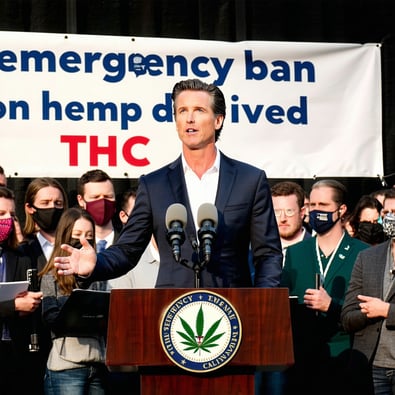The emergency ruling may eliminate 90-95% of hemp products, devastating the hemp market and sparking potential legal battles.
Governor Gavin Newsom‘s emergency ban on all hemp-derived THC products is official as of Monday afternoon, following the Office of Administrative Law’s approval.
This ban halts the sale of hemp products, including popular items like hemp-THC beverages and medicinal CBD products, throughout California. The regulatory action was confirmed by SFGATE.
Newsom justified the ban, stating that the previous regulations allowed underage youth access to intoxicating hemp-derived THC products. However, critics argue that this move bypasses a more measured, democratic process and could have unintended consequences for patients and the hemp industry at large.
Previously, California's Assembly rejected similar legislation (AB 2223) after strong opposition from the hemp industry. While the Assembly's decision was hailed as a win, Newsom's executive order has now enforced the ban.
Hemp Ban: Consequences
On September 16 the Hemp Roundtable made public a document presented to the Office of Administrative Law of California, signed by Attorneys at Frost Brown Todd in which they objected the measure. According to the statement the regulations would eliminate up to 90-95% of hemp products currently available. Farmers, manufacturers and retailers face immense financial losses as they are forced to shutter operations or relocate production outside California.
The ruling also includes a ban on manufacturing and selling hemp-THC products intended for sale outside California. This broad scope threatens the entire national supply chain, raising concerns over state overreach and violations of interstate commerce laws. This will probably lead to a judicial dispute of the emergency ruling.
Recently, an expert economist made a forecast for hemp acreage nationwide that includes a 82% reduction from previous estimations, which aligns with the projections of damage taken by the hemp complex as a whole.
Investor Impact
For investors, the ban creates a wave of uncertainty.
Many of California's hemp companies rely on a booming market for hemp-derived products. Small and mid-sized California companies were shifting from Cannabis to hemp due to the advantages that a less regulated and taxed environment. This change in the market structure for cannabis products will probable stop and businesses looking for alternative solutions or seeking to mitigate losses will likely need to restructure their offerings or face severe revenue losses.
The situation is provoking an exodus from hemp assets exposure among financial investors.
Patient Concerns
Perhaps the most vocal opposition to the ban comes from medical patients and their families.
According to a group of California parents with children suffering from chronic illnesses, this regulation could eliminate access to life-saving treatments. Families are also evaluating legal action against the state, citing that the ban not only impacts synthetic THC products but also vital full-spectrum CBD products that many rely on for conditions like epilepsy. Parents of affected children have been panic buying hemp derivatives to avoid interruption of treatments.
Impact On Organic Products
Co-founder of Cornbread Hemp, a company specialized in High Quality CBD products, Jim Higdon, reacted to the ban.
“The California cannabis market is undergoing a credibility crisis amid rampant pesticide contamination, and Gov Newsom just banned access to USDA organic hemp products, forcing California residents to take their chances in California dispensaries”
Higdon highlighted a contradiction in a e-mail exchange with Benzinga Cannabis, saying “How can Governor Newsom claim to be protecting consumer safety with an order that bans USDA organic hemp products?”
So Far… So Good?
California’s government is showing determination in moving forward with the ban on hemp, despite the messy impacts. While the emergency regulations remain in effect until March 25, 2025, the hemp industry and advocates are pushing back, suggesting a lengthy conflict ahead.



.png?width=550&height=395&name=image%20(1).png)

